初中英语必备常用词组辨析(31组)
英语词义辨析100组

英语词义辨析100组动词1. abandon desert discard quitabandon: 放弃,丢弃,抛弃。
指因为外界的压力或影响完全放弃,因迫不得已而放弃,如: abandon obligation 放弃任务。
desert: 抛弃,舍弃,指某人或某物在困境中“被抛弃”。
如: desert the baby after giving birth 生下婴儿后将其抛弃。
discard: 丢弃,抛弃(老朋友或旧物)。
如:discard one’s old friends 抛弃老朋友。
quit: 离开,退出,突然放弃。
指主动放弃或离开。
如: quit one’s job 辞职。
2. abolish cancel remove eliminateabolish: 废除,强调对法律或旧习惯的废除。
如: abolish slavery 废除奴隶制。
cancel: 取消,强调对原定的会议、计划、安排等取消。
如: cancel the meeting 取消会议。
remove: 出去,撤去。
强调位置的移动或从远处消失。
如: remove the stain from clothes 清除衣服上的污渍。
eliminate: 除去,剔除,淘汰。
强调使彻底消失。
如: eliminate sb. From competition 把某人淘汰出局,eliminate poverty 消除贫困3. abuse curse condemn criticizeabuse: 谩骂,辱骂;滥用,虐待。
指出口恶言骂人。
curse: 诅咒,咒骂。
表示愤怒或嫉恨。
condemn: 谴责,强调由于不良行为或过失而受到强烈谴责。
用于正式、严肃的场合。
criticize: 批评某人,强调指出某人的错误或不足之处。
4. accelerate speed hasten quickenaccelerate: 加速,既可指使物体加快速度运动,也可指使事情进程加快。
初中英语词汇词组辨析

56.quite ,very 很,十分1quite a +形容词+名词“一个相当……的……”quite a clever boy 一个相当聪明的男孩2a very+形容词+名词“一个非常……的”a very clever boy 一个非常聪明的男孩57.say,speak,talk,tell 说1say 后接说的内容,He says he likes English very much.2speak 后接语言,I can speak Japanese3talk “讨论,谈论”,可作动词也可作名词,talk about sth 谈论某件事,talk with /to sb 和某人谈话4tell ,“告诉,讲述”tell sb sth 告诉某人某件事,tell a story ,tell a lie 撒谎58.since, for 用于完成时态1since 后接时间点. Lucy has lived there since 1955. Lucy 自从1955年以来一直住在这里。
接“时间段+ago”I have been teaching since 10 years ago. 我教英语有10年了接“一般过去时态的句子”We have known each other since we were young.我们从小就认识。
2for 后接时间段。
We have studied for 9 years.我们学英语已经9年了。
59. so , such,如此,这样。
So /such ……that+否定句子=too……to+动词原形;so/such…+肯定句子=enough to+动词原形1so,修饰形容词或many,much,little,few(so good a boy 如此好的一个男孩(so much difficult 太多的困难He is so young that he can’t go to school=He is too young to go to school.他太小了,不能去上学。
英语常考近义词成语辨析100组

英语常考近义词成语辨析100组1. 喜欢 vs. 爱好 - 指对某一事物或活动的有好感或偏爱。
2. 开心 vs. 快乐 - 表示愉快的心情。
3. 困惑 vs. 迷惑 - 表示对某事情感到疑惑或莫名其妙。
4. 同情 vs. 同情心 - 表示对他人的困难或苦难感到理解和关切。
5. 感激 vs. 感谢 - 表示对别人的帮助或恩惠表示谢意。
6. 独特 vs. 特殊 - 表示与众不同或与常规不同。
7. 敏捷 vs. 灵活 - 表示动作或思维的迅捷程度。
8. 忠诚 vs. 诚实 - 表示对某人或某事的忠心和坦诚。
9. 本领 vs. 能力 - 表示某种技能或才能。
10. 合理 vs. 公正 - 表示合乎逻辑或公平正义。
11. 危险 vs. 风险 - 表示存在威胁或可能带来危险的情况。
12. 政府 vs. 政权 - 表示治理国家的机构或组织。
13. 友谊 vs. 友情 - 表示朋友之间的情感和关系。
14. 丰富 vs. 富裕 - 表示财富或资源充足。
15. 智慧 vs. 聪明 - 表示智力水平较高或思维敏捷。
16. 关注 vs. 关心 - 表示对某事物或某人的关注和关心。
17. 反对 vs. 抵制 - 表示不支持或反抗某一事物或行为。
18. 容易 vs. 简单 - 表示易于做到或理解。
19. 紧张 vs. 担忧 - 表示焦虑或担忧的情绪。
20. 信任 vs. 依赖 - 表示对某人或某事物的信心或依赖。
21. 目标 vs. 任务 - 表示需要完成的工作或目标。
22. 利益 vs. 好处 - 表示从某事物中获得的利益或好处。
23. 减少 vs. 缩小 - 表示数量或规模的减少。
24. 批评 vs. 指责 - 表示对某人或某事物的不满或责备。
25. 传统 vs. 习俗 - 表示某一群体传承下来的风俗或习惯。
26. 科学 vs. 学问 - 表示知识体系或某一学科的研究。
27. 知识 vs. 智慧 - 表示学习和了解的内容和能力。
初中英语重点短语辨析

初中英语重点短语辨析1. be made of / be made fromⅠ. be made of “由……制成/造”成品看得出原料。
如:The desk is made of wood. 这张桌子是木头制成的。
Ⅱ. be made from “由……制造/成”成品看不出原料。
如;Paper is made from rags.纸是由破布做的。
(已看不出原料)2. be pleased with/ at/ toⅠ. be pleased with “对……人/物,感到满意”介词with后接人或物。
如:① Both Mark and her mother were pleased with the girl. 马克和他妈妈都有喜欢这个女孩。
② I wasn’t very pleased with / at my exam results. 我对自己的考试成绩不太满意。
Ⅱ. be pleased at “对……某事/物,感到满意”。
介词at 常与事物搭配使用。
He was very pleased at the news.他对这个消息感到很满意。
Ⅲ. be pleased to “乐意……;因……而高兴”。
to 不是介词,而是小品词。
后接动词原形。
如:① I shall be pleased to go. 我将乐意去。
② We are quite pleased to be working in this country. 能在这个国家工作,我们是十分高兴的。
3. be sure of/ be sure to do/ be sure thatⅠ.be sure of “确信对……有把握”后接名词、代词或动词-ing 形式,表对客观事物有肯定的认识和判断,主语必须是人。
如:① As David joined our team, we are sure of winning the game this time.由于David参加了我们的球队,我们这次有把握取胜。
初中英语常见的30组词汇辨析!
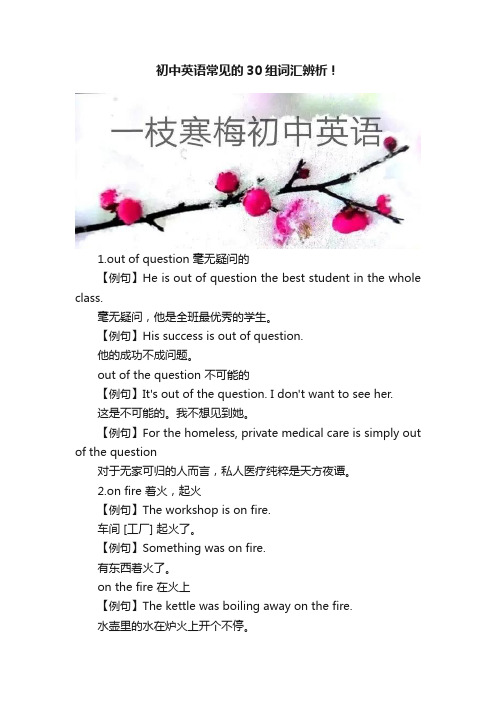
初中英语常见的30组词汇辨析!1.out of question 毫无疑问的【例句】He is out of question the best student in the whole class.毫无疑问,他是全班最优秀的学生。
【例句】His success is out of question.他的成功不成问题。
out of the question 不可能的【例句】It's out of the question. I don't want to see her.这是不可能的。
我不想见到她。
【例句】For the homeless, private medical care is simply out of the question对于无家可归的人而言,私人医疗纯粹是天方夜谭。
2.on fire 着火,起火【例句】The workshop is on fire.车间 [工厂] 起火了。
【例句】Something was on fire.有东西着火了。
on the fire 在火上【例句】The kettle was boiling away on the fire.水壶里的水在炉火上开个不停。
【例句】Put another lump of coal on the fire.往炉火上再加放一块煤。
3.in office 在职的,执政的【例句】He had nothing tangible to show off three years in office.他为官三年,无实绩可言。
【例句】Which political party is in office in your country ?贵国是哪一个政党执政?in the office 在办公室里【例句】He was wanted in the office.有人在办公室找他。
【例句】Would you introduce me to others in the office?你能把我介绍给办公室的其他人吗?4.the doctor and teacher 指一个人,既是医生又是老师。
初中英语300组常用词语辨析完整版

初中英语300组常用词语辨析Lesson495.bloom/flower/blossomⅠ.bloom指观赏用的花。
如:玫瑰;菊花;牡丹等。
Ⅱ.flower是普通用语。
Ⅲ.blossom指果树上的花。
96.boat/shipⅠ.boat“船、艇,”是普通用语。
主要指用浆、篙、帆或引擎的小船、小艇,但有时也指大轮船。
如:1We crossed the river by boat.我们乘船过河。
2They pulled the boat up on to the shore.他们把这条船拖上了岸。
(指小船③When does the boat leave for Shanghai?(指轮船Ⅱ.ship“船、舰,”多指大的航海船只。
如:1The ship is at sea.船厂在航海。
2They went to Guangahou by ship.他们乘船去广州。
97.bold/brave/courageousⅠ.bold“大胆的、勇敢的”着重指大胆、勇敢的气质,表现出有胆量、敢闯或敢于对抗而不畏缩。
如:1Be bold!勇敢些!2It’s very bold of us to v enture to go to sea.我们冒险航海是很勇敢的。
Ⅱ.brave“勇敢的”,应用最广泛,通常指在危险、困难或可怕的情况下表现勇猛而畏缩。
如:1Be brave!勇敢些!2It was brave of him to enter the burning building.他敢进入那燃烧着的房屋,真是勇敢。
Ⅲ.courageous“勇敢的,无畏的”表示由于有勇敢的气质或不屈不挠的精神而能无畏地自觉地对付某种事情,常常用于表示道义上的勇敢。
如:1He is courageous in telling the truth.他敢于讲实话。
2We hope that they will courageously shoulder their responsibilities and overcome all difficulties.我们希望能够勇敢地负起责任,克服一切困难。
专为中考考生准备的初中英语常用短语、词语辨析
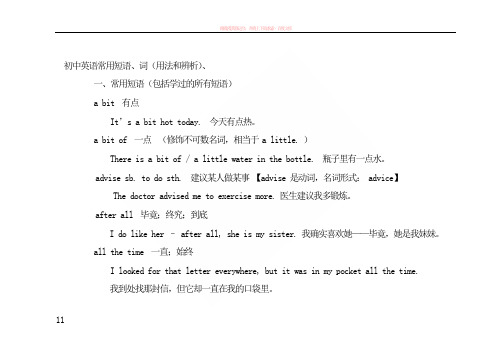
初中英语常用短语、词(用法和辨析)、一、常用短语(包括学过的所有短语)a bit 有点It’s a bit hot today. 今天有点热。
a bit of 一点(修饰不可数名词,相当于a little. )There is a bit of / a little water in the bottle. 瓶子里有一点水。
advise sb. to do sth. 建议某人做某事【advise 是动词,名词形式:advice】The doctor advised me to exercise more. 医生建议我多锻炼。
after all 毕竟;终究;到底I do like her – after all, she is my sister. 我确实喜欢她——毕竟,她是我妹妹。
all the time 一直;始终I looked for that letter everywhere, but it was in my pocket all the time.我到处找那封信,但它却一直在我的口袋里。
11and so on 等等Asas soon as 一……就……【由该短语引导的时间状语从句,需用一般现在时态表示将来时】I’ll call you as soon as I get there. 我一到那里就给你打电话。
as well (在口语中用得很多,用法和too 一样,两者可以互换,通常位于句末)I can do it as well. 我也能做这件事。
as well as 除……之外;并;和;也He gave me money as well as advice. 他除了给我中告外,还给了我钱。
ask for 请求;要①ask for +某人意思是:找某人,要求见某人Someone is asking for you at the door. 门口有人找你。
②ask for +某物意思是:要某物He wants to ask for some water. 他想要些水。
(完整)初中英语词汇辨析
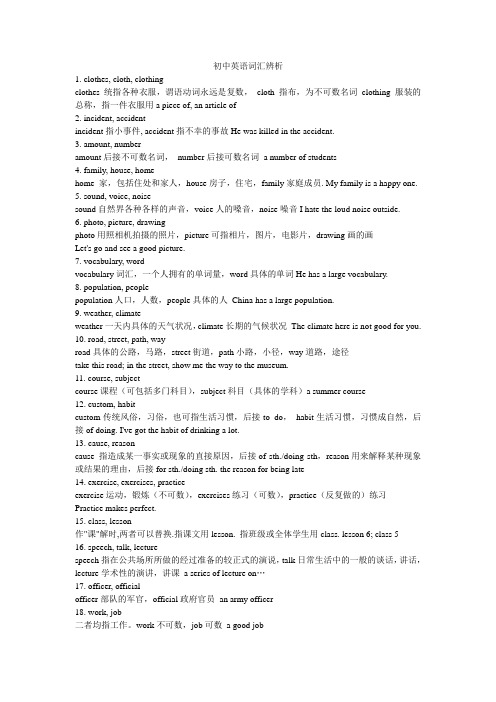
初中英语词汇辨析1. clothes, cloth, clothingclothes统指各种衣服,谓语动词永远是复数,cloth指布,为不可数名词clothing 服装的总称,指一件衣服用a piece of, an article of2. incident, accidentincident指小事件, accident指不幸的事故He was killed in the accident.3. amount, numberamount后接不可数名词,number后接可数名词a number of students4. family, house, homehome 家,包括住处和家人,house房子,住宅,family家庭成员. My family is a happy one.5. sound, voice, noisesound自然界各种各样的声音,voice人的嗓音,noise噪音I hate the loud noise outside.6. photo, picture, drawingphoto用照相机拍摄的照片,picture可指相片,图片,电影片,drawing画的画Let's go and see a good picture.7. vocabulary, wordvocabulary词汇,一个人拥有的单词量,word具体的单词He has a large vocabulary.8. population, peoplepopulation人口,人数,people具体的人China has a large population.9. weather, climateweather一天内具体的天气状况,climate长期的气候状况The climate here is not good for you.10. road, street, path, wayroad具体的公路,马路,street街道,path小路,小径,way道路,途径take this road; in the street, show me the way to the museum.11. course, subjectcourse课程(可包括多门科目),subject科目(具体的学科)a summer course12. custom, habitcustom传统风俗,习俗,也可指生活习惯,后接to do,habit生活习惯,习惯成自然,后接of doing. I've got the habit of drinking a lot.13. cause, reasoncause 指造成某一事实或现象的直接原因,后接of sth./doing sth,reason用来解释某种现象或结果的理由,后接for sth./doing sth. the reason for being late14. exercise, exercises, practiceexercise运动,锻炼(不可数),exercises练习(可数),practice(反复做的)练习Practice makes perfect.15. class, lesson作"课"解时,两者可以替换.指课文用lesson. 指班级或全体学生用class. lesson 6; class 516. speech, talk, lecturespeech指在公共场所所做的经过准备的较正式的演说,talk日常生活中的一般的谈话,讲话,lecture学术性的演讲,讲课a series of lecture on…17. officer, officialofficer部队的军官,official政府官员an army officer18. work, job二者均指工作。
30组常用短语辨析
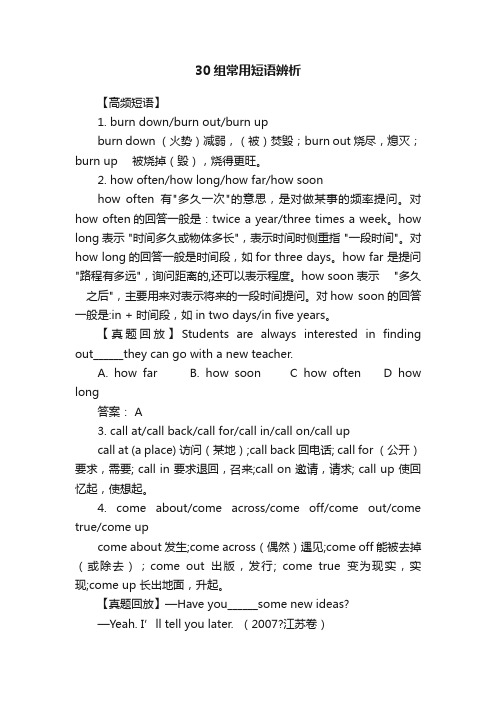
30组常用短语辨析【高频短语】1. burn down/burn out/burn upburn down (火势)减弱,(被)焚毁;burn out烧尽,熄灭;burn up 被烧掉(毁),烧得更旺。
2. how often/how long/how far/how soonhow often有"多久一次"的意思,是对做某事的频率提问。
对how often的回答一般是:twice a year/three times a week。
how long表示 "时间多久或物体多长",表示时间时侧重指 "一段时间"。
对how long的回答一般是时间段,如for three days。
how far 是提问"路程有多远",询问距离的,还可以表示程度。
how soon表示"多久之后",主要用来对表示将来的一段时间提问。
对how soon的回答一般是:in + 时间段,如in two days/in five years。
【真题回放】Students are always interested in finding out______they can go with a new teacher.A. how farB. how soon C how often D how long答案: A3. call at/call back/call for/call in/call on/call upcall at (a place) 访问(某地);call back 回电话; call for (公开)要求,需要; call in 要求退回,召来;call on 邀请,请求; call up 使回忆起,使想起。
4. come about/come across/come off/come out/come true/come upcome about 发生;come across(偶然)遇见;come off 能被去掉(或除去);come out出版,发行; come true变为现实,实现;come up 长出地面,升起。
初中英语易混淆短语
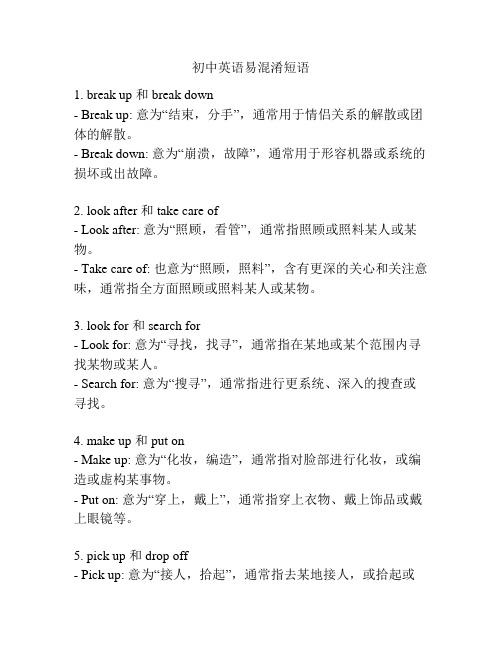
初中英语易混淆短语
1. break up 和 break down
- Break up: 意为“结束,分手”,通常用于情侣关系的解散或团体的解散。
- Break down: 意为“崩溃,故障”,通常用于形容机器或系统的损坏或出故障。
2. look after 和 take care of
- Look after: 意为“照顾,看管”,通常指照顾或照料某人或某物。
- Take care of: 也意为“照顾,照料”,含有更深的关心和关注意味,通常指全方面照顾或照料某人或某物。
3. look for 和 search for
- Look for: 意为“寻找,找寻”,通常指在某地或某个范围内寻找某物或某人。
- Search for: 意为“搜寻”,通常指进行更系统、深入的搜查或寻找。
4. make up 和 put on
- Make up: 意为“化妆,编造”,通常指对脸部进行化妆,或编造或虚构某事物。
- Put on: 意为“穿上,戴上”,通常指穿上衣物、戴上饰品或戴上眼镜等。
5. pick up 和 drop off
- Pick up: 意为“接人,拾起”,通常指去某地接人,或拾起或
捡起某物。
- Drop off: 意为“送人,放下”,通常指把某人送到某地,或放下或丢下某物。
6. turn on 和 switch on
- Turn on: 意为“打开”,通常指打开电器或开关的动作。
- Switch on: 也意为“打开”,特别指通过切换开关打开电器或电源。
初中英语常见词汇辨析

初中英语常见词汇辨析英语近义词辨析1.辨析:such和so:二者都表示程度,“如此;这样”,其区别为:注意:“such+a/an +adj+可数名词单数形式”可与“so+adj+a/an+可数名词单数形式”转换。
She is such a kind girl.=She is so kind a girl.2.each和every注意:each不能与almost,nearly及not搭配使用,而every可以。
Almost every window was broken.Not every student went on holiday.Each不能用于否定句,在否定句中应用none。
None of the books are mine.3.alone与lonelyShe was alone in the dark room.她独自一人呆在那间黑暗的屋子里。
He lives alone but he doesn't feel lonely.他独自生活,但并不感到孤独。
It's a lonely beach.那是一个人迹罕至的海滩。
4.stop doing sth与stop to do sth.One of +可数名词复数:……之一,做主语时,谓语动词要用单三形式。
12/ 1初中英语常见词汇辨析English is one of my favorite subjects.One of my friends knows you.5.few,a few与little,a littleThere are few eggs on the plate,so I must buy some.盘子里没几个鸡蛋了,所以我必须买一些There are a few eggs on the plate,so I needn't buy any at once.There's little milk in the glass.杯子里没多少牛奶了。
中考易混淆单词词组汇总
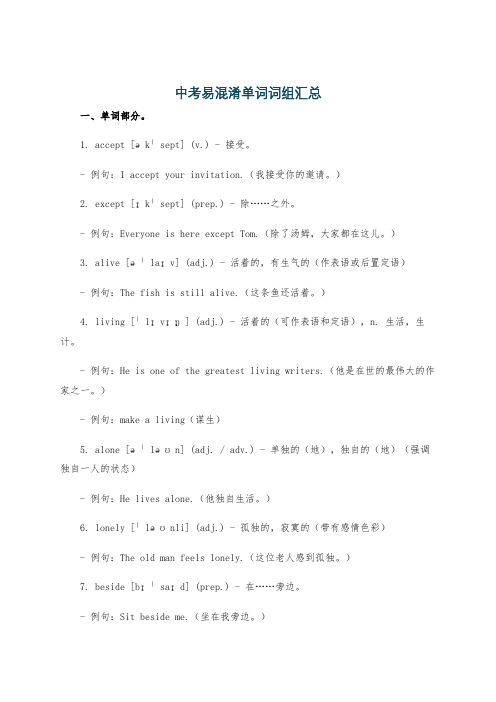
中考易混淆单词词组汇总一、单词部分。
1. accept [əkˈsept] (v.) - 接受。
- 例句:I accept your invitation.(我接受你的邀请。
)2. except [ɪkˈsept] (prep.) - 除……之外。
- 例句:Everyone is here except Tom.(除了汤姆,大家都在这儿。
)3. alive [əˈlaɪv] (adj.) - 活着的,有生气的(作表语或后置定语)- 例句:The fish is still alive.(这条鱼还活着。
)4. living [ˈlɪvɪŋ] (adj.) - 活着的(可作表语和定语),n. 生活,生计。
- 例句:He is one of the greatest living writers.(他是在世的最伟大的作家之一。
)- 例句:make a living(谋生)5. alone [əˈləʊn] (adj. / adv.) - 单独的(地),独自的(地)(强调独自一人的状态)- 例句:He lives alone.(他独自生活。
)6. lonely [ˈləʊnli] (adj.) - 孤独的,寂寞的(带有感情色彩)- 例句:The old man feels lonely.(这位老人感到孤独。
)7. beside [bɪˈsaɪd] (prep.) - 在……旁边。
- 例句:Sit beside me.(坐在我旁边。
)8. besides [bɪˈsaɪdz] (prep. / adv.) - 除……之外(还有),此外。
- 例句:Besides English, we also learn French.(除了英语,我们还学法语。
)- 例句:I don't like this dress. Besides, it's too expensive.(我不喜欢这条裙子。
它太贵了。
常用英语词语辨析105组

1.elder 与elderly两者都为“年⽼的”,但有细微的差别。
elderly 指中年与暮年之间的年龄,表⽰⼈已过中年,因此,这词常⽤来代替 old。
如:an elderly gentleman. ⼀位年长的绅⼠。
elder指年龄稍长者,适⽤于家庭的兄弟姐妹之间。
如: Tom is the elder of the two.汤姆是两个孩⼦中较⼤的⼀个。
2.precious 和 expensiveexpensive 表⽰“昂贵的”。
如:The drink was cheap , but the food was very expensive . 饮料很便宜,但⾷物很贵。
precious 表⽰“珍贵的,宝贵的”。
如:The children are precious to me . 孩⼦们对我来说很重要。
3.regret to do 和 regret doingregret doing 表⽰“做了某事⽽感到遗憾或后悔”,v-ing 动作发⽣在regret 之前。
如:I regretted missing the train. 我为没有赶上⽕车⽽感到很懊恼。
regret to do 指“当时或现在遗憾地做什么”。
如:I regret to tell you that we can 't stay here any longer. 我遗憾地告诉你,我们不能在这⼉多呆了。
4.day by day 和 day after day两词组意思很近,但有区别:day by day 只⽤作状语,表⽰“⼀天天地”, 有逐渐转变的意思。
如:Day by day she seems to grow a little taller.她似乎⼀天天地长⾼了。
day after day 可作主语,宾语等,亦可作状语,表⽰“⼀天⼜⼀天”,强调动作的重复,表⽰时间的长久。
如: We do the same work day after day. 每天我们做着同样的事情。
初中英语考试必考重点词语辨析汇总
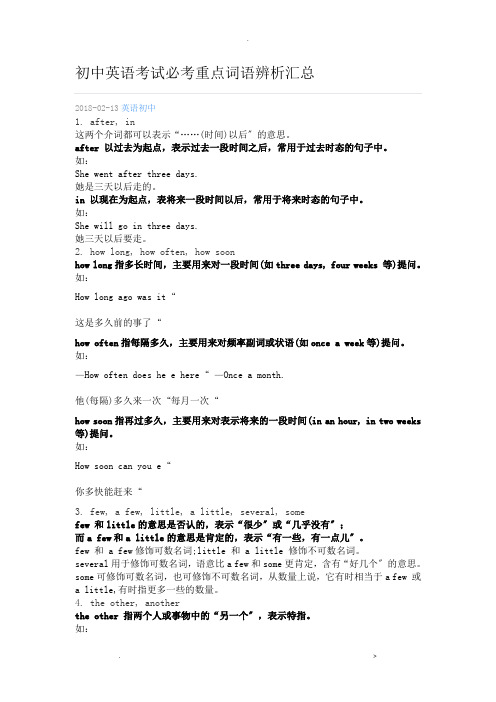
初中英语考试必考重点词语辨析汇总2018-02-13英语初中1. after, in这两个介词都可以表示“……(时间)以后〞的意思。
after 以过去为起点,表示过去一段时间之后,常用于过去时态的句子中。
如:She went after three days.她是三天以后走的。
in 以现在为起点,表将来一段时间以后,常用于将来时态的句子中。
如:She will go in three days.她三天以后要走。
2. how long, how often, how soonhow long指多长时间,主要用来对一段时间(如three days, four weeks 等)提问。
如:How long ago was it“这是多久前的事了“how often指每隔多久,主要用来对频率副词或状语(如once a week等)提问。
如:—How often does he e here“—Once a month.他(每隔)多久来一次“每月一次“how soon指再过多久,主要用来对表示将来的一段时间(in an hour, in two weeks 等)提问。
如:How soon can you e“你多快能赶来“3. few, a few, little, a little, several, somefew 和little的意思是否认的,表示“很少〞或“几乎没有〞;而a few和a little的意思是肯定的,表示“有一些,有一点儿〞。
few 和 a few修饰可数名词;little 和 a little 修饰不可数名词。
several用于修饰可数名词,语意比a few和some更肯定,含有“好几个〞的意思。
some可修饰可数名词,也可修饰不可数名词,从数量上说,它有时相当于a few 或a little,有时指更多一些的数量。
4. the other, anotherthe other 指两个人或事物中的“另一个〞,表示特指。
人教七八年级易混淆词组辨析
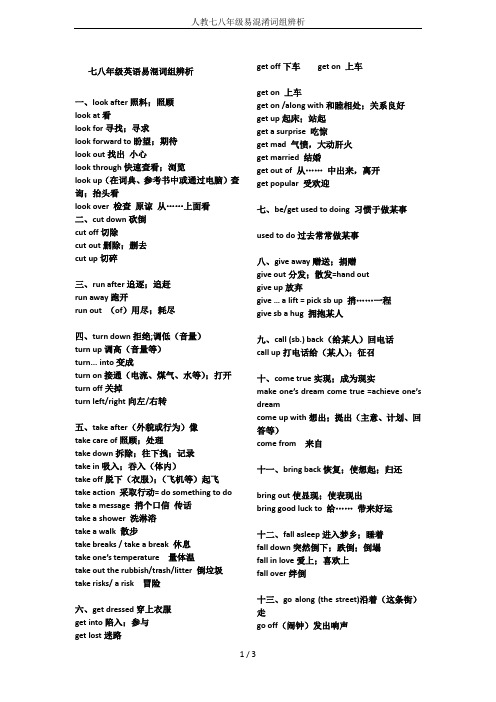
七八年级英语易混词组辨析一、look after照料;照顾look at看look for寻找;寻求look forward to盼望;期待look out找出小心look through快速查看;浏览look up(在词典、参考书中或通过电脑)查询;抬头看look over 检查原谅从……上面看二、cut down砍倒cut off切除cut out删除;删去cut up切碎三、run after追逐;追赶run away跑开run out (of)用尽;耗尽四、turn down拒绝;调低(音量)turn up调高(音量等)turn... into变成turn on接通(电流、煤气、水等);打开turn off关掉turn left/right向左/右转五、take after(外貌或行为)像take care of照顾;处理take down拆除;往下拽;记录take in吸入;吞入(体内)take off脱下(衣服);(飞机等)起飞take action 采取行动= do something to do take a message 捎个口信传话take a shower 洗淋浴take a walk 散步take breaks / take a break 休息take one’s temperature 量体温take out the rubbish/trash/litter 倒垃圾take risks/ a risk 冒险六、get dressed穿上衣服get into陷入;参与get lost迷路get off下车get on 上车get on 上车get on /along with和睦相处;关系良好get up起床;站起get a surprise 吃惊get mad 气愤,大动肝火get married 结婚get out of 从……中出来,离开get popular 受欢迎七、be/get used to doing 习惯于做某事used to do过去常常做某事八、give away赠送;捐赠give out分发;散发=hand outgive up放弃give … a lift = pick sb up 捎……一程give sb a hug 拥抱某人九、call (sb.) back(给某人)回电话call up打电话给(某人);征召十、come true实现;成为现实make one’s dream come true =achieve one’s dreamcome up with想出;提出(主意、计划、回答等)come from 来自十一、bring back恢复;使想起;归还bring out使显现;使表现出bring good luck to 给……带来好运十二、fall asleep进入梦乡;睡着fall down突然倒下;跌倒;倒塌fall in love爱上;喜欢上fall over绊倒十三、go along (the street)沿着(这条街)走go off(闹钟)发出响声go out外出(娱乐)go straight 直走go online 上网go to the movies 看电影十四、make sure确保;查明make up编造(故事、谎言等)make a choice /choices 做出选择make a difference 影响有作用make a mess 弄得一团糟make an effort 作出努力make friends with sb 和某人交朋友make one’s bed 铺床make one’s own decision 自己做决定make soup 做汤十五、put off推迟put up搭起;举起张贴put sth. to good use好好利用某物put away 收好,放好put down 写下记下十六、set out出发;启程set up建起;建立十七、have a cold/ stomachache/fever 感冒/胃疼/发烧/have a conversation with…和……交谈have a look 看一看have a point 有道理have… in common 有相同特征have to do with 与……有关十八、keep… away from 避免接近,远离Keep / stop/ prevent sb from doing sth 阻止某人做某事十九、feel free to do 随便做某事feel like doing sth 愿意喜欢做某事feel like 给……感觉,感受到二十、play a part in 参与某事play a role 发挥作用,有影响play chess 下棋play volleyball 打排球play the piano 弹钢琴二十一、call up打电话给(某人);征召cheer up(使)变得更高兴;振奋起来clean up打扫(或清除)干净cut up切碎dress up装扮;乔装打扮end up最终成为;最后处于fix up修理;装饰give up放弃grow up长大;成熟hurry up赶快;急忙look up查找make up编造(故事、谎言等)pick up捡起;接电话put up搭起;举起stay up熬夜wake up醒;叫醒二十二、blow out吹灭bring out使显现;使表现出check out察看;观察clear out清理;丢掉find out查明;弄清give out分发;散发go out外出(娱乐)hand out分发hang out闲逛;常去某处lay out摆开;布置run out (of)用尽;耗尽sell out卖光set out出发;启程work out成功地发展;解决eat out 出去吃饭try out 参加选拔试用watch out 当心小心=look out二十三、let... down使失望lie down躺下write down写下;记录下up and down 上上下下take down 拆除记录二十四、agree with同意;赞成、disagree with 反对compare... with比较;对比connect... with把……和……连接或联系起来deal with应付;处理part with放弃、交出(尤指不舍得的东西)along with 连同,除……以外help sb with sth 在某方面帮助某人provide sb with sth 为某人提供某物二十五、care bout 关心在意care for 照顾喜欢take care of = look after 照顾二十六、think about 思考思索think of 认为二十七、ask for 请求care for 照顾喜欢pay for 付费prepare for 为……做准备thank sb for …为……而感谢二十八、hear from 接到某人的信、电话prevent sb from doing sth 阻止某人做某事protect sb from doing sth 保护某人不受伤害keep sb away from 使某人远离,避免接近二十九、belong to 属于listen to 听……pay attention to 注意关注talk to 跟……说三十、as for 至于,关于at least 至少at last 最后at good prices 以非常合理的价钱三十二、in a row 连续几次in fact 实际上in half 分成两半in line with 与……成一排in one’s opinion 依……看in order to 目的是为了in person 亲自in public 公开的in silence 沉默无声的in that case 既然那样in the end 最后in the face of 面对三十三、according to 依据to be honest 说实在的to one’s surprise 使……惊讶的,出乎意料的。
初中英语常用词语辨析大全

初中英语常用词语辨析-从A ....。
....。
...。
.。
.。
..。
....。
.。
.。
. ..。
.。
.。
..。
.。
....。
..1.at the moment\in a moment\for a moment\at the moment=right now"此时此刻",用于现在时。
in a moment = very soon “很快,立即”,一般用于将来时的句子.for a moment “此刻,一会儿”表示时间的延续。
[例] He is out at the moment.此刻他不在家。
I will come back in a moment.我一会儿就回来。
Hold on for a moment.请稍候。
.。
.......。
....。
.。
.。
...。
.。
...。
...。
....。
.。
.2.a few/ few(1)a few, few 用来修饰可数名词.(2)a few “有一些”,表示肯定概念,few 几乎没有,表示否定意义。
[例] The man has been here for many years, so he has a few friends。
这个人在这里住了很多年了,他有一些朋友。
I am a new comer here, so I have few friends here.我刚来到这里,所以我在这里没有几个朋友。
.。
.。
..。
.。
....。
..。
.。
.。
.。
...。
..。
.。
..。
.。
.。
..。
.。
3.a little/ little(1) a little, little 用于修饰不可数名词。
(2) a little “有一些”,表示肯定概念。
little “几乎没有”,表示否定概念.[例] There is a little water in the glass.杯子里有一些水。
There is little water in the glass, so you can’t drink any.杯子里几乎没有水了,你不可能喝到水了. ...。
初中英语常见词汇辨析

英语近义词辨析注意:“such+a/an +adj+可数名词单数形式”可与“so+adj+a/an+可数名词单数形式”转换。
She is such a kind girl.=She is so kind a girl.2.each和every注意:each不能与almost,nearly及not搭配使用,而every可以。
Almost every window was broken.Not every student went on holiday.Each不能用于否定句,在否定句中应用none。
None of the books are mine.H e lives alone but he doesn’t feel lonely.他独自生活,但并不感到孤独。
I t’s a lonely beach.那是一个人迹罕至的海滩。
4.stop doing sth与stop to do sth.English is one of my favorite subjects.One of my friends knows you.There are few eggs on the plate,so I must buy some.盘子里没几个鸡蛋了,所以我必须买一些There are a few eggs on the plate,so I needn’t buy any at once. There’s little milk in the glass.杯子里没多少牛奶了。
There’s a little milk in the glass.杯子里有一点牛奶。
我们班上任何人都知道这些歌手中的任何一个和他们歌曲中的任何一首。
这类形容词:interest和interesting、excited和exciting、surprised和surprisingThe boy was very excited when he heard the exciting news.Try做vi,意为“尝试、努力”I don’t think I can do it ,but I‘ll try.Try:做名词,”尝试”,have a try.“试一试”11.作“花费”:cost/spend/take /payI spent 200 yuan on a new coat.Don’t spend too much time watching TV.The dictionary cost me 89 yuan.It took Mr. Green an hour to finish his work yesterday.I paid 15 yuan for the pen .12.Through over acrossIt began to rain.However,we went out to look for the boy. You may be right but I don’t believe you.None of us went to the park.No one wants to leave.——who like that place?>——no one.Jim was writing a letter when I came in.另外,while 还可意为“而;然而”,表示两种情况的对比。
初中英语常用词语辨析完整版
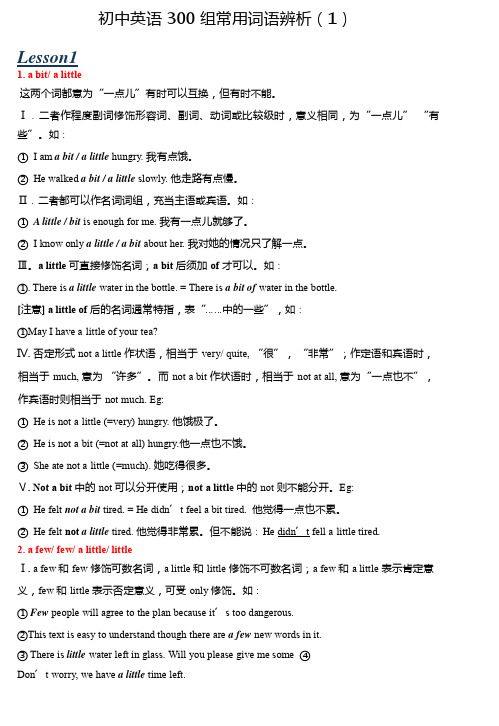
初中英语 300 组常用词语辨析(1)Lesson11. a bit/ a little这两个词都意为“一点儿”有时可以互换,但有时不能。
Ⅰ.二者作程度副词修饰形容词、副词、动词或比较级时,意义相同,为“一点儿”“有些”。
如:①I am a bit / a little hungry. 我有点饿。
②He walked a bit / a little slowly. 他走路有点慢。
Ⅱ.二者都可以作名词词组,充当主语或宾语。
如:①A little / bit is enough for me. 我有一点儿就够了。
②I know only a little / a bit about her. 我对她的情况只了解一点。
Ⅲ。
a little 可直接修饰名词;a bit 后须加of 才可以。
如:①. There is a little water in the bottle. = There is a bit of water in the bottle.[注意]a little of后的名词通常特指,表“……中的一些”,如:①May I have a little of your tea?Ⅳ. 否定形式 not a little 作状语,相当于very/ quite, “很”,“非常”;作定语和宾语时,相当于much, 意为“许多”。
而not a bit 作状语时,相当于not at all, 意为“一点也不”,作宾语时则相当于not much. Eg:①He is not a little (=very) hungry. 他饿极了。
②He is not a bit (=not at all) hungry.他一点也不饿。
③She ate not a little (=much). 她吃得很多。
Ⅴ. Not a bit中的not 可以分开使用;not a littl e 中的not 则不能分开。
Eg:①He felt not a bit tired. = He didn’t feel a bit tired. 他觉得一点也不累。
- 1、下载文档前请自行甄别文档内容的完整性,平台不提供额外的编辑、内容补充、找答案等附加服务。
- 2、"仅部分预览"的文档,不可在线预览部分如存在完整性等问题,可反馈申请退款(可完整预览的文档不适用该条件!)。
- 3、如文档侵犯您的权益,请联系客服反馈,我们会尽快为您处理(人工客服工作时间:9:00-18:30)。
初中英语常用词组辨析(31组)1、Look和See答:a. look一词单独用时,表示“看!”,通常要放在句首。
如:Look! There is a monkey in the tree. 看!树上有一只猴子。
b. look at表示要看具体的内容,如人或物。
如:Don’t look at me. Look at the blackboard, please.不要看我,请看黑板。
c. see表示看的结果,即“看到;看见”。
如:Can you see the words on the blackboard? 你能看见黑板上的字吗?see也用于“看电影”这个词组中,即:see a film2、Spend take paypay 的主语必须是人: (sb) pay money for sth. / pay sb.for sth.;spend的主语必须是人: (sb.) spend money/...for/on sth./ in doing sth. 在......方面花钱或精力;take表示做某事花费多少时间, 其主语一般是一件事 ; 有时也可以是人: It takes/ took sb. some time to do sth. 强调完成动作所花费的时间。
① It takes sb. some time to do sth.It took him half an hour to finish his homework.他花了半个小时完成家庭作业。
② sb. spends some time/money on sth./(in) doing sth.I spent thirty yuan on this book.我三十元买了这本书。
She spent ten minutes (in) getting there.她10分钟到达那儿。
③ sb. pays (some money) for sth.He paid a lot of money for the building.他买房子花了许多钱。
表“花费”的动词中,还有一个,即cost:cost 的主语必须是物或事: (sth.) cost(s) sb. money/life/health/time...;This coat cost me eighty yuan.这件上衣花了我80元。
3、on in atat介词at表时间、表地点。
(1)at表示时间,用于钟点前,用于时刻前,译为"在......时(刻)"。
如:at three/three o'clock 在三点。
at a quarter to six 六点差一刻。
at noon 在中午,at night 在夜晚, at midnight 在半夜at breakfast/lunch/supper 在吃早饭/午饭/晚饭时at this time of day 在每天这个时候(2)at表示地点,一般用于较小的地名(方)前,译为"在......"。
如:at home 在家,at the station 在车站(3)at表示处于......状态,译为"从事于......"。
如:at school 在上学,at work 在工作【相关链接】at加名词一般可与现在进行时态互换使用,表示正在进行的动作,试比较:They are at work./They are working.2.in小小介词in,用途却很多。
可表时间,表地点,表手段、方法、材料。
(1)in表示时间,用于泛指一天的上午、下午、晚上等;用于某个较长的时间,如年、月、季节等。
如:in the morning/afternoon/evening在上(下午)或晚上,in 2003在2003年,in the day/daytime 在白天【相关链接】in还可以表示"从现在起一段时间以后"。
如:They will see you in a week.他们将在一周后去看你。
另外,in和at都可以表示时间,但in表示较长的时间,而at表示时间的某一点。
例如:He got up late in the morning and had a meal at noon.他早上起得晚,所以只吃午餐。
(2)in表示地点、场所,译为"在......里"、"在......中"。
如:in the factory 在工厂,in the room 在房间里,in the sun 在阳光下,in the middle of...在......的中央【相关链接】in和at都可表示地点,而in表示的地点比at所表示的地点大。
(3)in表示用语言,用......材料。
译为"用......,以......方式"。
如:in English用英语,in ink 用墨水(4)in表示穿戴的状态,译为"戴着、穿着"。
如:in the white shirt穿着白色的衬衫,in the cap戴着帽子【相关链接】in表示"穿(戴)着"是介词,指状态,同wear一样。
in后接表示服装类的名词或表示颜色的词。
如:Kate is in a red skirt./Kate wears a red skirt.凯特穿着红裙子。
3.on介词on表示时间、地点、方位等。
(1)on表示时间,用于星期、日期(包括该天的各部分)。
如:on Sunday/Sundays,on Monday morning /afternoon/evening等。
on也用于某一日的名词前,用于公共节假日前。
如:On New Year's Day 在元旦,on Children's Day 在儿童节等。
(2)on表示地点、位置,有"在......旁"、"接近"、"靠近"之意。
如:a house on the main road 临大街的房子, sit on my right 坐在我的右边(3)on表示状态,译为"处于......情况中,从事于......"等。
如:on duty 值日,on holiday 度假(4)on表示"在......上面",用在表示物体的名词前。
如:on the box 在盒子上【相关链接】on和over都是介词,on表示"在......上面",指一物体与另一物体表面相接触;over表示"在......上方",指一物体与另一物体不接触。
试比较:There is a light on the desk.桌子上有盏台灯。
(light与desk接触)There is a light over the desk.桌子上方有一盏灯。
(light与desk不接触)【特别提示】表示"在......上",介词on与in必须注意习惯用法,否则会出错。
不妨比较一番:on the tree/in the tree都译为"......在树上"。
前者表示树上本身所长着的叶子、花、果实等;后者表示某物或某人在树上。
on the wall/in the wall都译为"在墙上"。
由于介词不同,在使用上有区别。
图画、黑板、风筝等"在墙上",是因为它们在墙的表面上,故用on the wall;门窗、钉子、洞、孔等"在墙上",是因为它们在墙的里面,故用in the wall。
4、clothes和clothingclothes泛指服装,包括上、下装,内、外衣clothing是衣着的总称,无复数形式,如:man''s clothing5、 a bit与a littlea bit和a littlea bit和a little都有“一点、少许”之意。
两进用作名词时,不能直接跟名词或代词,而必须用介of连接。
如:Well, Mrs Green, may be he has caught a bit of cold.There’s a little (=bit of) time left. 还剩一点儿时间。
She knows a bit (=little) of English. 她懂一点儿英语。
a bit 和a little也可用作副词,后面跟形容词或副词。
如:The jacket is a bit (=little) large. 这件夹克有点大。
That’s a bit expensive. Can I try them on, please?He ran a little faster than me. 他跑得比我快一点。
little还可用作形容词,表示“小的”、“几乎没有”。
如: a little girl(一个小姑娘)、 a little water(有一点水)注意:not a little 和not a bit的意思完全不同,前者是“许多、很”,后者是“一点儿也不”、“毫不”。
试对比:It’s not a bit cold. 天一点儿也不冷。
It’s not a little cold.天很冷。
6、everyday和every dayEveryday是形容词,意思是“日常用的”;every day“每天”是句词短语作状语。
例如:You must pay attention to your____English.A.every day’sB.everydayC.everyday’sD.every day7、have to和must首先,两者都可译为“应该”或“必须”,都是情态助动词,这是它们的共同之处;但在用法上有以下重要区别:⑴ have to表示客观条件决定不得不做某事语气较弱;must表示说话人主观的看法,语气较强。
例如:Do I have to say the words?我必须说这些话吗?You must work hard at English.你必须努力学习英语。
⑵must 只有一种形式,而have to有人称、数和时态的形式变化。
例如:She has to go to school earlier.她应当早一点儿上学。
(一般现在时,单数第三人称)I''ll have to write to him this evening.今晚我必须给他写信。
(一般将来时)He had to look after his sister yesterday.8、look,look at,see都是“看”的意思。
